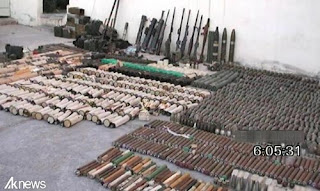 |
| BM-21 missiles |
MORE than 500 BM-21 missiles were found stacked in wooden crates in the basement of Ivory Coast's Presidential Palace, where foreign leaders came only weeks ago to mediate a peaceful end to the country's political crisis.
 |
| Laurent Gbagbo |
The extent of former president Laurent Gbagbo's arsenal is being revealed as arms are discovered in caches around the city -- enough military might to wage an extended civil war had Mr Gbagbo not been captured on Monday.
"We have here significant stocks of heavy arms, which shows clearly the UN Security Council resolution was appropriate and that the opportunity was taken to get rid of these weapons," President Alassane Ouattara's secretary-general, Amadou Gon Coulibaly, said yesterday, referring to the resolution that authorised the UN and French helicopter gunships to attack and destroy heavy arms this past week.
Pro-Gbagbo soldiers held out for days in the Presidential Palace in the centre of the city, which was finally over-run on Wednesday. Mr Coulibaly said he surveyed the premises on Thursday and found the arms caches.
In the basement of the palace were at least 532 cases of BM-21 missiles. Crates of mortars, grenades and ammunition littered the gardens, and boxes of emergency medical supplies were stacked in a presidential office.
 |
| Arms caches |
UN spokesman Hamadoun Toure said yesterday dozens of UN vehicles went through Abidjan as part of a peace parade led by the UN peacekeeping mission's head, Choi Young-jin, to assess security in the city and encourage people to return to normal.
More than a million civilians fled their homes amid the fighting, which shut down the economy of the cocoa-producing nation.
Oxfam's humanitarian manager in Liberia, where about 135,000 Ivorians have fled, said many refugees were too afraid to return home anytime soon.
 |
| Ivorians refugees in Liberia |
A coalition of aid agencies said yesterday that the West African country had descended into a humanitarian disaster, with hundreds of thousands at risk without urgent international assistance.
In some areas, violence continued. A resident of Micao in the industrial zone of Abidjan's Yopougon suburb said yesterday that forces fighting for Mr Ouattara, called Republican Forces, were coming to the area at night and dragging out people identified as former soldiers in the defeated army that was accused of turning heavy weapons on civilians. They then shot them, the resident said on condition of anonymity for fear of reprisal.
All around Abidjan yesterday, teams of Red Cross workers shovelled charred corpses into body bags, while UN peacekeepers gathered more weapons, throwing them into waiting dump trucks for disposal.
"We receive calls at our call centre telling us where the bodies are," said Franck Kodjo, who led a Red Cross team.
Three armies are patrolling the streets of Abidjan: the white jeeps and trucks of the UN, the green camouflaged tanks of the French army and the ragtag pick-up trucks of the disparate group of former rebels who fought to put Mr Ouattara in power. All three claim to share the mission of protecting the population and encouraging a return to normality.
The UN is primarily concerned with weapons caches, the French with protecting foreigners and evacuating them to their base in the south of the city, and the pro-Ouattara forces seem to be elbowing each other for territory, accusing each other of looting and assuming the mantle of authority they fought so hard to win.
Mr Gbagbo refused to cede power after losing a November election, leading to the standoff that killed large numbers of people. He was finally arrested by Ivorian soldiers at his home.
Mr Ouattara said on Wednesday that Mr Gbagbo would be kept in a villa and that the new Justice Minister was preparing for his possible prosecution.
No comments:
Post a Comment